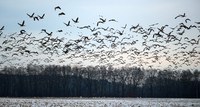Highly Pathogenic Avian Influenza Continues to Impact Wild and Domestic Birds
(Click the image below to view a high-resolution image that can be downloaded)
The number of positive cases of highly pathogenic avian influenza (HPAI) continues to increase in North Dakota. To date, the virus has been confirmed in 13 domestic flocks and 108 positive cases in wild birds.
HPAI is a disease that affects both domestic and wild birds. The virus is shed in the feces and respiratory secretions of infected birds and is able to survive for weeks in cool, damp environments.
Although uncommon in North America, HPAI can sometimes circulate in waterfowl, presenting a risk to a number of other avian species, including raptors.
“Waterfowl may carry and shed this virus without any symptoms, while birds like domestic poultry and raptors get severe illness and rapidly die,” says Dr. Gerald Stokka, North Dakota State University Extension veterinarian and livestock stewardship specialist. “Currently, little is known about the risk of transmission and illness in songbirds.”
The majority of wild bird cases have been documented in snow geese and Ross’s geese. The other wild bird cases in the state have been documented in raptor species including red-tailed hawk, great horned owls, snowy owls and bald eagles. There also has been a case documented in an American crow. A complete list of wild bird cases can be accessed on the Animal and Plant Health Inspection Service website: https://www.aphis.usda.gov/aphis/ourfocus/animalhealth/animal-disease-information/avian/avian-influenza/hpai-2022/2022-hpai-wild-birds.
“It is expected that the potential for transmission and new cases will decline following migration,” says Miranda Meehan, NDSU Extension livestock environmental stewardship specialist. “Unfortunately, the winter weather we are experiencing is slowing down migration and causing migratory birds to remain in the state longer.”
“The best way to reduce the potential for transmission of HPAI is to reduce interaction between birds,” says Mary Keena, NDSU Extension livestock environmental management specialist. “This includes between wild birds, between wild and domestic birds, as well as between domestic flocks.”
NDSU Extension specialists have developed tips for reducing transmission of HPAI.
To reduce transmission within wild birds:
- Since little is known about HPAI susceptibility of and transmission through songbirds, you may consider pausing the use of bird feeders and baths which encourages birds to gather together.
- Report sick or deceased wild birds to the North Dakota Game and Fish Department at https://gf.nd.gov/wildlife/diseases/mortality-report. Wild bird avian influenza questions can be directed to 701-204-2161.
To reduce transmission between wild and domestic birds:
- If possible, keep poultry housed until the risk for transmission has decreased. Non-lethal methods to deter wild birds are available on the USDA wildlife damage webpage: https://www.aphis.usda.gov/aphis/ourfocus/wildlifedamage/sa_reports/ct_wildlife+damage+management+technical+series.
- Reduce the attractiveness for wild birds to stop at your place by cleaning up litter and spilled feed around your domestic poultry housing.
- If you come in contact with or handle wild birds, change into clean clothes, wash your hands and disinfect your footwear prior to contact with domestic birds.
- Report sick or deceased wild birds.
- In the event you need to handle or dispose of carcasses to reduce potential interactions, be sure to follow the appropriate procedures: https://www.ndsu.edu/agriculture/ag-hub/highly-pathogenic-avian-influenza.
To reduce transmission between domestic flocks:
- Keep your distance. Restrict access to your property and your birds. Allow contact from people who care for your birds but minimize visitors.
- Do not haul disease home. If you have been near other poultry or poultry owners, such as at feed stores, clean and disinfect car and truck tires. New birds should be kept separate from your flock for at least 30 days.
- Do not borrow disease from your neighbor. Do not share lawn and garden equipment, tools or poultry supplies with your neighbor or other poultry owners.
To help protect wild and domestic bird populations from HPAI, it is important that we remain vigilant and report sick and deceased birds, says Stokka.
Report sick or deceased wild birds to the North Dakota Game and Fish Department at https://gf.nd.gov/wildlife/diseases/mortality-report. Report sick domestic birds to your local veterinarian or the North Dakota State Board of Animal Health at 701-328-2655.
NDSU Agriculture Communication – April 22, 2022
Source: Gerald Stokka 701-231-5082, gerald.stokka@ndsu.edu
Source: Mary Keena, 701-652-2951, mary.keena@ndsu.edu
Source: Miranda Meehan, 701-231-7683, miranda.meehan@ndsu.edu
Editor: Elizabeth Cronin, 701-231-7881, elizabeth.cronin@ndsu.edu


